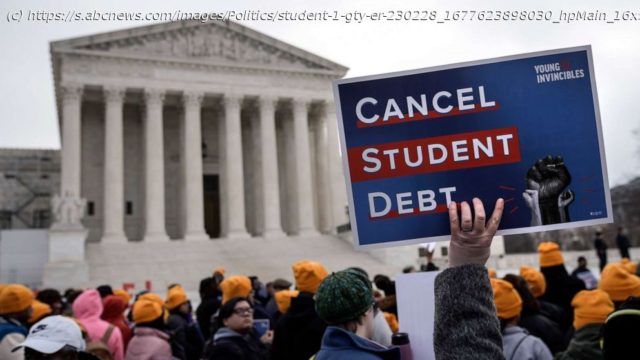Array
Hundreds of activists and borrowers traveled to the Supreme Court on Tuesday as President Joe Biden’s administration defended its sweeping student debt cancellation plan in oral arguments before the justices.
Some supporters of the program said they camped out the night before, weathering the low temperatures and rain, to witness the Supreme Court justices’ nearly four-hour questioning in two cases challenging Biden — with the bulk of the time lending itself to the lawsuit brought by six GOP-led states, which contended that Biden’s debt forgiveness plan overstepped his legal authority as the federal government argued the states had no standing to try and block what they called crucial economic relief.
Biden initially rolled out his cancellation plan in August, intending to begin forgiving loans in late 2022. He announced at the time that his administration would forgive up to $10,000 of federal student loan debt per borrower, so long as they annually made under $125,000 or $250,000 as a married couple, and an additional $10,000 for people who received Pell grants, which are given to low-income families.
But the plan, which the White House has said could be used by some 40 million Americans, was halted by lawsuits in November.
On Tuesday in Washington, the cases to decide the fate of the program turned out a young crowd of college students and recent graduates from around the country.
Kiara Palmer, a 33-year-old who said she incurred more than $50,000 in student loan debt while getting a master’s degree from American University, that the Trump and Biden administrations pausing payments for three years during the COVID-19 pandemic — a taste of what debt cancellation would look like — gave her breathing room to put down a payment on a house. That was a big step for her, she said, since her own mother had faced foreclosures on their house after taking out loans to get a teaching degree.
“I got to do something that I just didn’t think would ever happen,” Palmer said.
“When you’re in a debt like that, $53,000 … you can’t focus on anything but that. And that hurts your aspirations, your future, your goals,” she said.
To people who oppose debt relief, Palmer cited taxpayer-funded economic assistance during previous turmoil as evidence that there’s precedent.
Home
United States
USA — Financial Student loan borrowers share burdens of debt as states argue cancellation is...






